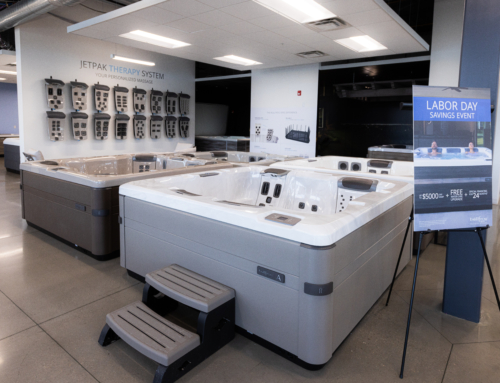As a spa sales professional, your success in retail spa sales can vary according to several factors, many of which are beyond your control. These factors may include your location, the economy, and what advertising is being done. However, attitude is not based on these specific factors, but on how you choose to interpret them. So unlike our control over external events, we are actually in control of our own attitude. (That’s what the experts say anyway.)
Author of the best-selling book Attitude is Everything: Change Your Attitude … and You Change Your Life, Jeff Keller writes, “In short, attitude is the mental filter through which one sees the world.” It is critical to recognize that the percentage of time you spend on being content compared to being miserable can be adjusted for your benefit.
fMRI neuro-imagery documents that consumers primarily use emotions instead of information when evaluating product options. - Psychology Today
Instead of asking if your attitude sucks, let’s look at this a different way. What’s the difference between you and a champion? A champion thinks, “I know that some trouble and grief are an inevitable part of life. I’m miserable for brief periods when I should be, and I’m happy the rest of the time.”
Top sales performers operate in a similar way. They are practiced in the art of consciously swapping out their pessimistic mental filter for an optimistic filter, in turn creating a more resourceful attitude.
According to David Straker, M.Sc. Psychology, M.Sc. Management, Postgraduate Certificate in Education, and Diploma in Marketing and publisher of changingminds.org, selling is “about your whole approach to yourself, your company, your products and, of course, your customers.” Straker narrows this idea down to three words: confidence, pride, and care.
Confidence, Pride, & Care
 Confidence defined means full trust and belief in the powers, trustworthiness, or reliability of a person or thing. Self-confidence is the belief in oneself and one’s power or ability. “In order to create trust, the first thing that you sell is yourself.” Straker argues that the basis of all successful selling is confidence.
Confidence defined means full trust and belief in the powers, trustworthiness, or reliability of a person or thing. Self-confidence is the belief in oneself and one’s power or ability. “In order to create trust, the first thing that you sell is yourself.” Straker argues that the basis of all successful selling is confidence.
Pride in who your company is and what it sells is powerful when communicating with your customers. Harvard Business Review studies have shown that a salesperson who is proud to represent the brand and brand values performs better than one who doesn’t. This kind pride can serve as an intrinsic motivator not just for you, but for your customers too.
Caring for your customers extends beyond going through your product line with them. By asking and responding to their problems or concerns, you can prove your willingness to help even more effectively. And when others know that you care about them on a personal level, they will be far more willing to trust you. (Again, according to the experts.)
Emotions are Key
So what do the experts say about why people buy and how can you use that knowledge to actively create more sales?
The first day of Microeconomics 101 typically addresses the question, “Why do people buy things?” And then the professor explains the technical meaning of “utility.” This term roughly translates to “it makes them feel good.” For one reason or another, every purchase your customers make is because it simply provides a sense of satisfaction.
It is often argued that decisions are derived from rational analysis of the available choices. The reality, however, is that emotions play a critical role in the decision-making process. USC Neuroscience Professor Antonio Damasio studied people having sustained damage to the area of the brain that connects thoughts and emotions. Damasio found that these people were capable of rationally processing information about potential alternatives. But he also found that they were not actually able to make decisions because they lacked any sense of how they felt about the options.
“In order to create trust, the first thing that you sell is yourself.” - David Straker, changingminds.org
Damasio’s work showed that, when we are tasked with making a choice, “emotions from previous, related experiences affix values to the options we are considering.” In other words, emotions create preferences that lead to our decision. As reported in Psychology Today, fMRI neuro-imagery even documents that consumers primarily use emotions (i.e., personal feelings and experiences) instead of information when evaluating product options (attributes, features, and facts).
When your customer walks through the doors of your showroom to look at the spas you have for sale, they already have in mind why they would like to buy a hot tub. Maybe they are excited about your product, maybe they like the benefits they believe a hot tub can bring them, or maybe they like the idea of how people will view their purchase of a spa. Whatever their reason, remember that it’s based on emotions. And you have the ability to hone in on those. But emotions can be fickle. So if you want your customers to stay positive and focused on the satisfaction a hot tub will bring them, then you need to be equally positive and focused.
Steps You Can Take
 Every one of us really does have the potential to present a positive and focused front. As a salesperson, there are tried-and-true steps you can practice towards meeting this goal.
Every one of us really does have the potential to present a positive and focused front. As a salesperson, there are tried-and-true steps you can practice towards meeting this goal.
1. Harness the power of your body. A good attitude starts with convincing yourself that you have a good attitude. Ever heard the phrase, “Fake it ’til you make it?” If you want to have a good sales attitude, then show it all day long with the power of your body.
-
-
- Smile
- Maintain a good, upright posture
- Elevate your eyes
- Walk with confidence
-
2. Check your inner conversation. The average human has 40,000 thoughts every day. How many of those thoughts are working against you and your sales attitude?
-
-
- Focus on what you want to happen rather than what you don’t want to happen. Another way of saying this is: focus on the solution, rather than the problem. Remember that your thoughts become your actions—if you want to have a good sales attitude, then you need to maintain positive sales thoughts.
- Think of ways you can serve your customer rather than ways you can personally benefit from the sale. This more positive line of thinking will resonate with your customers and keep you feeling positive about your relationship with them.
-
3. Prepare, prepare, and prepare. If you want to be a confident, positive salesperson then you need to know your product inside and out.
-
-
- Be able to describe not just product features, but benefits each of those features represent. This way, you will have answers for any common questions or objections a customer may have.
- Preparation allows you to act naturally and comfortably with your customers because you are not worried about what you need to say next.
-
4. Be authentic. Salespeople get a bad rap because they are known for being disingenuous and manipulative. Customers can detect this and won’t stick around if they think your approach may not be authentic.
-
-
- Customers know who really cares about them and their needs. They will be much more inclined to give you their business if you sincerely care. So care.
- Be your true, unique self. It’s not hard to tell when someone is putting up a facade. If you are genuine and honest with your customer, they won’t feel like you’re trying to hide something.
- The greatest benefit of authenticity is that you will be living your life with self-confidence, high values, and integrity.
-
So how does your attitude rank when considering these important traits of a salesperson? Can you identify your strengths? And where do you have room for improvement? A successful sales attitude manifests itself in satisfied customers, as well as satisfying sales.









Leave A Comment